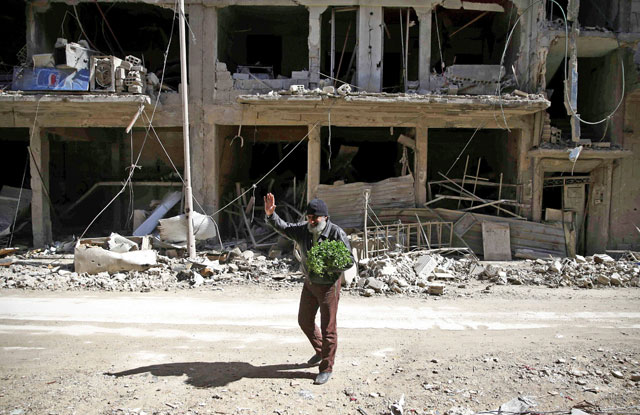AMSTERDAM — The world's chemical weapons watchdog opened an investigation on Sunday into attacks in the besieged, rebel-held Syrian region of Eastern Ghouta to determine whether banned munitions had been used, diplomatic sources told Reuters.
The Organisation for the Prohibition of Chemical Weapons (OPCW) will examine attacks including one on Sunday, which health authorities said killed a child and caused symptoms consistent with exposure to chlorine gas, the sources said.
Political leaders in France, the United States and United Kingdom said this month they would back targeted military action against Damascus if there were proof chemical weapons had been used by forces under President Bashar Assad.
The investigation by the OPCW fact-finding team comes as Syrian warplanes continued to strike Eastern Ghouta on Tuesday, despite a Russian call for a five-hour daily truce to allow the 400,000 people living there under siege to leave.
The sources spoke on condition of anonymity, because they were not permitted to discuss the operation in public.
Use of chlorine as a chemical weapons is prohibited under the 1997 Chemical Weapons Convention. If inhaled, chlorine gas turns into hydrochloric acid in the lungs and the build-up of fluids can drown victims.
The latest OPCW mission is seeking to determine whether chemical weapons were used in violation of the international weapons convention, which Syria signed in 2013 after hundreds died in a massive sarin gas attack in Ghouta.
The OPCW will not assign blame.
"OPCW's technical secretariat continues to examine all credible allegations of chemical weapons use, reported by media or other sources, including the most recent allegations," it said when asked about the investigation into the Ghouta attacks.
The OPCW team does not plan to travel to Ghouta because of safety concerns — two visits by inspectors in 2013 and 2014 were ambushed — but will gather witness testimony, photographic and video evidence, and interview medical experts, the sources said.
A UN-OPCW joint investigative mechanism, established by the United Nations to identify those behind chemical weapons attacks, concluded in 2016 that Syrian government forces had used chlorine on three occasions.
It also concluded last year that Syrian government forces were behind a sarin nerve agent attack on the town of Khan Sheikhoun that killed more than 80 people, many of them women and children.
The United States fired 59 cruise missiles at Syria's Shayrat Airbase in April, saying it had been used by Assad's forces to carry out the sarin attack.
Syria and its close ally Russia, which provides military support to Assad's forces, deny using chemical weapons and blame insurgents.
The use of chemical weapons has become systematic in Syria's seven-year war, but political rifts between Western powers and Russia have hamstrung the United Nations and the OPCW, leaving them unable to act against violations of international law.
A renewal of the joint UN-OPCW mission's mandate was vetoed by Moscow at the UN Security Council.
